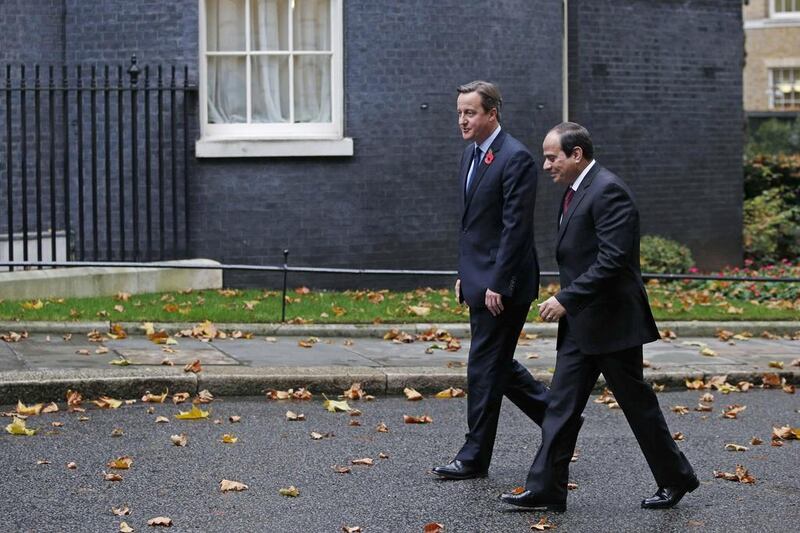LONDON // Growing suspicion that militants blew up the Russian passenger jet above the Sinai desert on Sunday, killing all 224 on board, clouded talks between Egypt’s president Abdel Fattah El Sisi and the British prime minister David Cameron in London on Thursday.
As Britain banned all flights to the Egyptian resort of Sharm El Sheikh, from where the Metrojet Airbus began its doomed journey, the fate of the aircraft dominated the agenda at the Downing Street meeting.
Egypt and Russia both regard as premature the statements from western powers, notably the United States and Britain, suggesting the involvement of ISIL or other extremists in destroying the plane.
Mr El Sisi had stressed on the eve of his UK visit that caution was needed in determining the cause of the crash, citing the lengthy period taken by British authorities to lay blame for the terrorist attack that brought down Pan Am 103 over the Scottish town of Lockerbie in 1988. A Libyan intelligence officer Abdelbaset Al Megrahi, was eventually convicted in 2001 of the murders of the 270 people killed in the attack, on the aircraft and on the ground.
But before and after his meeting with Mr El Sisi, the British prime minister said it was “more likely than not” that a bomb caused Sunday’s disaster.
ISIL has already sought to claim responsibility for destroying the Airbus. Despite some earlier scepticism from security analysts, a US official said on Wednesday the Obama administration had reached the “tentative” conclusion that an affiliate of the extremist group in the Sinai peninsula had planted an explosive device on the plane.
Mr Cameron said all flights between Britain and Egypt’s Sinai Peninsula had been cancelled. However, late on Thursday night, the UK government announced it would allow flights from Sharm El Sheikh to resume on Friday to repatriate some of the 20,000 British tourists stranded in Sharm El Sheikh.
Other countries have also taken action to protect travellers. Germany’s Lufthansa Group announced on Thursday that it would cancel flights of its subsidiary airlines – Edelweiss and Eurowings – to Sharm El Sheikh. The Dutch foreign ministry said it was advising citizens against travel to or from Sharm El Sheikh airport but would leave decisions on suspending flights up to individual airlines.
France, meanwhile, advised its nationals against all non-essential travel to Sharm El Sheikh, as well as the coastal town of Taba, close to the Israeli border.
Mr Cameron said he regretted the disruption caused to those British tourists stranded at Sharm El Sheikh but insisted the action was essential after “intelligence and information” indicated that a bomb was the likely cause of the crash.
He had “every sympathy” with Egypt, given the country’s reliance on tourism, he added, but had to “put the safety of British people first”.
However, the prime minister was at pains to emphasise after his meeting with Mr El Sisi that the two countries were working intensively together to establish what caused the crash, and its consequences for tourists, “in a spirit of close cooperation”.
He committed his government to seeking a return to normal air traffic between Britain and the resort as soon as possible but said he was obliged to act on the intelligence and advice he received from experts.
Mr Cameron had phoned the Russian president Vladimir Putin earlier on Thursday to discuss the crash. Russian officials said Mr Putin had urged the British prime minister to await the findings of official investigations.
Both Mr Cameron and Mr El Sisi said their talks had been friendly and constructive and hailed the closeness of relations between the two countries. Mr Cameron said there had been “excellent discussions” on a range of topics.
Mr Cameron said Britain’s long-awaited official report on Muslim Brotherhood activity in the UK would be published later this year.
The Times newspaper reported on Thursday that the prime minister had finally decided the Brotherhood – already considered a terrorist organisation by the UAE, Egypt, Saudi Arabia and Syria – should face new curbs.
“In terms of our review of the Muslim Brotherhood, which we discussed today, that will be published later this year and I think you will see, as you are already seeing in Britain, a much more robust approach against extremism, against extremism of all kinds, and against those extremists who stop just short of endorsing violence,” Mr Cameron said.
Mr El Sisi’s visit was a subject of intense controversy in Britain because of criticism of Egyptian counter-terrorism actions since the Egyptian president took power last year. More than 50 parliamentarians put their names to a statement claiming the bilateral talks would give the impression that abuses of human rights were tolerated. Demonstrators gathered outside the gates to Downing Street, but the Egyptian president avoided them by arriving via a neighbouring government building.
In interviews before flying to London, Mr El Sisi mounted a strong defence of his actions as president, saying important steps had been made to develop democracy but making clear it was a “work in progress”. He said strong measures were essential to defend the state against a grave threat from terrorists.
Syria, Iraq and the post-Qaddafi conflict and chaos in Libya were also on the agenda for the Downing Street talks. Mr El Sisi believes Britain and other Nato members must do more to counter the threat from ISIL and other extremist groups in the region.
Meanwhile, Egypt’s minister of civil aviation, Hossam Kamal, insisted that his country’s airports complied with international security standards. He added that “the investigation team does not have yet any evidence or data confirming this hypothesis” of a bomb bringing down the Metrojet.
Mr El Sisi also defended security at Sharm El Sheikh, telling a news conference after the Downing Street meeting that a British team of experts had visited the airport 10 months ago, fully studied the precautions in place and reported that they were satisfied with them.
foreign.desk@thenational.ae
* With additional reporting by Agencies






